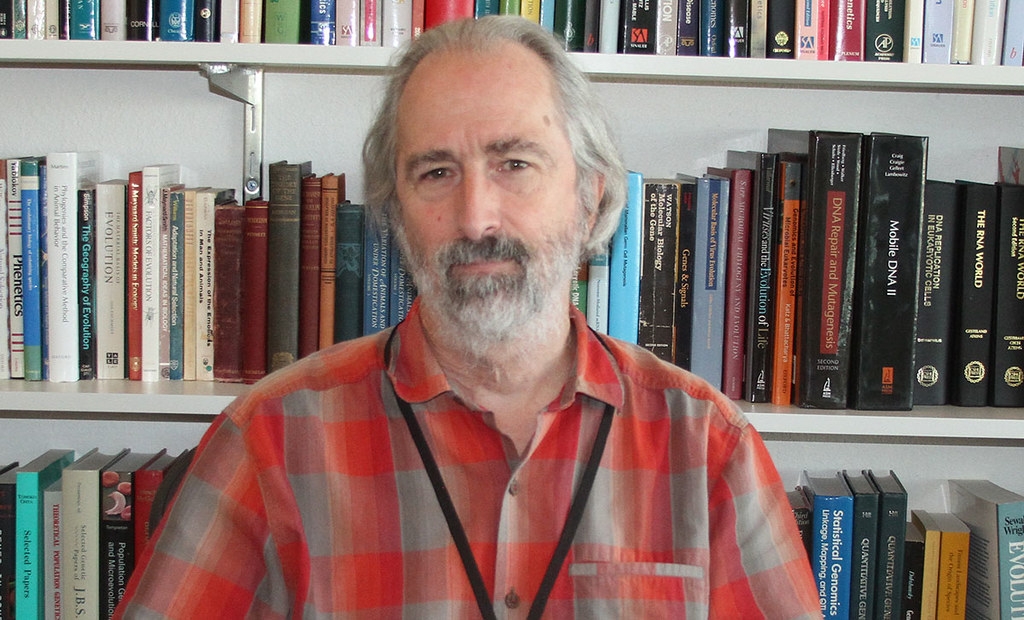Biodesign researcher Michael Lynch wins coveted lifetime achievement award in genetics

Michael Lynch, director of the Biodesign Center for Mechanisms of Evolution at Arizona State University, is the winner of the 2022 Genetics Society of America Thomas Hunt Morgan Medal for his far-reaching and influential contributions to science.
Michael Lynch, director of the Biodesign Center for Mechanisms of Evolution at Arizona State University, is the winner of the 2022 Genetics Society of America Thomas Hunt Morgan Medal for his far-reaching and influential contributions to science.
The award, one of the most prestigious in the field of genetics, is granted in honor of an individual member’s exceptional lifetime accomplishments as well as history of dedicated mentorship to fellow geneticists.
The Genetics Society of America is an international community of more than 5,000 scientists devoted to advancing the field of genetics. The Thomas Hunt Morgan Medal was established in 1981 and named in honor of the prominent geneticist Thomas Hunt Morgan (1866–1945). Morgan’s genetic work on DrosophilaDrosophila is a genus of flies, belonging to the family Drosophilidae, whose members are often called "small fruit flies." Source: Wikipedia earned him the Nobel Prize in 1933 for discoveries unlocking the secrets of heredity, marking the first experimental verification that chromosomes are the carriers of genetic information.
“Given the numerous luminaries who have received this award in the past, few in the areas of evolutionary genetics, this was an extraordinary surprise and honor, and also a testament to how population and quantitative genetics is viewed among the broader community," Lynch said.
Lynch has followed Morgan’s tradition of penetrating inquiry over a lengthy and diverse career. His current research focuses on exploration of the underlying mechanisms of evolution at the gene, genomic, cellular and phenotypic levels. In more than 250 research publications, he has deepened the field’s understanding of the role of mutation, random genetic drift and recombination.
Over 160 years after Darwin’s “On the Origin of Species,” the field of evolutionary study remains not only the cornerstone of biology but one of the most explosively active areas of research in the life sciences. One of Lynch’s primary objectives is to integrate evolutionary theory with cell biology, using principles from population genetics and biophysics.
As Lynch explains in a paper published in Proceedings of the National Academy of Sciences, “Natural selection is just one of several evolutionary mechanisms, and the failure to realize this is probably the most significant impediment to a fruitful integration of evolutionary theory with molecular, cellular and developmental biology.”
Lynch has been a major force in the development of neutral theories in which varying population sizes of different lineages influence mutation rates and guide the way in which genome architectures are ultimately structured. Such research has helped expand the discipline beyond the purely adaptive explanations of genes and evolution that have dominated the field since Charles Darwin.
Michael Lynch is the director of the Biodesign Center for Mechanisms of Evolution and a professor in ASU's School of Life Sciences. He is the principal investigator for the new NSF-funded Biological Integration Institute for Mechanisms of Cellular Evolution.
To advance these investigations, he recently formed the Biological Integration Institute on Mechanisms of Cellular Evolution, focusing on the emergent field of evolutionary cell biology and supported by the National Science Foundation.
His quantitative and theoretical insights on the mechanisms of evolution are illuminated by laboratory investigations of a range of organisms, including the microcrustacean Daphnia, the ciliate Paramecium and many diverse microbial species.
The integration of evolution and cell biology is one of the last uncharted research terrains in evolution. In addition to addressing foundational issues in evolutionary theory and exploring the intricacies of cell structure and function, the research has many practical applications. These include investigations of the emergence of antibiotic resistance, the explosive growth of destructive microbial populations such as blue-green algal blooms, organismal responses to climate change and the development of new methods of biomass production.
“I was thrilled, but not surprised, at the announcement of this prestigious award to Professor Lynch. He is a prolific scientist who has been a pioneer in the field for decades,” said Joshua LaBaer, executive director of the ASU Biodesign Institute. “Further, his leadership of the new Biological Integration Institute will place the ASU Biodesign Institute at the forefront of investigations into the new and largely unexplored domain of evolutionary cell biology.”
Lynch is a member of the U.S. National Academy of Sciences and a fellow of the American Academy of Arts and Sciences. He has also served as president of the Genetics Society of America; the Society for Molecular Biology and Evolution; the Society for the Study of Evolution; and the American Genetics Association. Previously, he has held faculty positions at the University of Illinois, University of Oregon and Indiana University.
The Thomas Hunt Morgan Medal is only the most recent in a string of prestigious awards earned by Lynch, which includes the Lifetime Contribution Award from the Society for Molecular Biology and Evolution, bestowed in 2021.
Lynch is the author of several highly influential books, including two with Bruce Walsh focusing on quantitative genetics: “Genetics and Analysis of Quantitative Traits,” 1998, and “Selection and Evolution of Quantitative Traits,” 2018. In 2007, “The Origins of Genome Architecture” appeared, a book the journal Nature referred to as “… the best, most up-to-date and thorough summary of genome evolution published.”
His most recent book, “The Origins of Cellular Architecture,” is available in its entirety online.
More Science and technology

Applied Materials invests in ASU to advance technology for a brighter future
For nearly 60 years, global giant Applied Materials has been hard at work engineering technology that continues to change how…

Meet ASU engineering students who are improving health care, computing and more
Furthering knowledge of water resource management, increasing the efficiency of manufacturing point-of-care health diagnostic…

Turning up the light: Plants, semiconductors and fuel production
What can plants and semiconductors teach us about fuel production?ASU's Gary Moore hopes to find out.With the aim of learning how…


